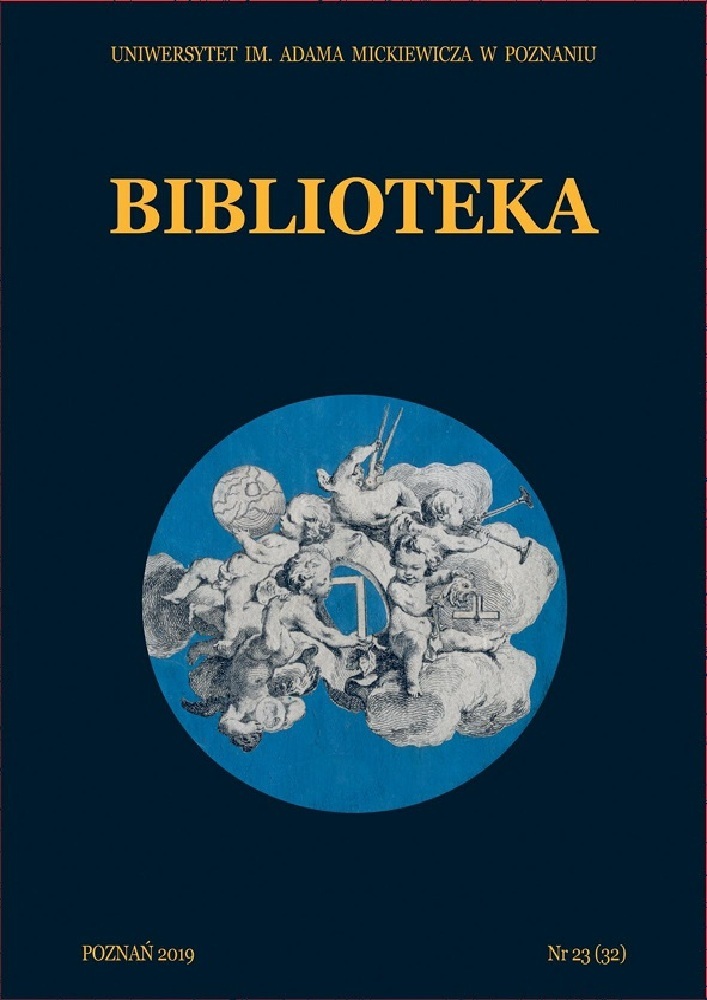Abstrakt
W artykule przedstawiono rozwój oraz cechy charakterystyczne masowych otwartych kursów online (MOOC). Na podstawie literatury przedmiotu zaprezentowano również tematykę kursów MOOC w kontekście wykorzystania ich przez bibliotekarzy akademickich, zarówno w zakresie rozwoju usług bibliotecznych i współpracy z innymi jednostkami uczelni, jak również w kontekście osobistego rozwoju zawodowego.
Bibliografia
Ahlberg C., Moocs at Karolinska Institutet University Library, „Insights” 2014, t. 27 (2), s. 160–165, doi: 10.1629/2048-7754.116. DOI: https://doi.org/10.1629/2048-7754.116
Barnes C., MOOCs: The Challenges for Academic Librarians, „Australian Academic & Research Libraries” 2013, t. 44, nr 3, s. 163–175, doi: 10.1080/00048623.2013.821048. DOI: https://doi.org/10.1080/00048623.2013.821048
Cervone H.F. Three trends in higher education and their potential impact on information agencies, „OCLC Systems & Services: International digital library perspectives” 2015, t. 31, z. 1, s. 7–10, doi: 10.1108/OCLC-10-2014-0034. DOI: https://doi.org/10.1108/OCLC-10-2014-0034
Diagnoza szkolnictwa wyższego. Program rozwoju szkolnictwa wyższego do 2020 r. Część III. Diagnoza szkolnictwa wyższego, red. J. Górniak, Warszawa: Fundacja Rektorów Polskich, Konferencja Rektorów Akademickich Szkół Polskich 2015.
Gaebel M., MOOC masowe otwarte kursy online, Warszawa: Fundacja Rozwoju Systemu Edukacji 2014, http://czytelnia.frse.org.pl/media/mooc-michael-gaebel-eua-frse.pdf [dostęp: 31.07.2019].
Gore H., Massive Open Online Courses (MOOCs) and Their Impact on Academic Library Services: Exploring the Issues and Challenges, „New Review of Academic Librarianship” 2014, t. 20 (1), s. 4–28, doi: 10.1080/13614533.2013.851609. DOI: https://doi.org/10.1080/13614533.2013.851609
Gurba K., MOOC: historia i przyszłość, Kraków: Uniwersytet Papieski Jana Pawła II w Krakowie, Wydawnictwo Naukowe 2015, doi: 10.15633/9788374384711. DOI: https://doi.org/10.15633/9788374384711
Kaushik A., Kumar A., Periodical literature on MOOCs and LIS domain, „International Journal of Information Dissemination and Technology” 2015, t. 5 (1), s. 37–40.
Kettunen T., Weimer K., Vainikka V., Helminen P. Information Seeking MOOC Goals at the University of Helsinki, „Nordic Journal of Information Literacy in Higher Education” 2019, nr 1, doi: 10.15845/noril.v11i1.2787. DOI: https://doi.org/10.15845/noril.v11i1.2787
Kuri R., Maranna O., MOOCs: A new platform for LIS Professional Development, w: 8th KSCL Conference on Libraries with no boundaries, Kuvempu University, Shimoga, February 16th & 17th 2017, http://eprints.rclis.org/32396/[dostęp: 31.07.2019]
Masowy otwarty kurs online, https://pl.wikipedia.org/wiki/Masowy_otwarty_kurs_online [dostęp: 31.07.2019].
Muczyński B., Trendy oraz nowe inicjatywy MOOC w Europie. 2015, https://www.slideshare.net/bmuczynski/trendy-oraz-nowe-inicjatywy-mooc-w-europieprzegld[dostęp: 31.07.2019].
Murray S., Moocs struggle to lift rock-bottom completion rates, „Financial Times”, 4.03.2019, https://www.ft.com/content/60e90be2-1a77-11e9-b191-175523b59d1d [dostęp: 31.07.2019].
Next Steps identified in final group discussions, w: MOOCs and Libraries: Massive Opportunity or Overwhelming Challenge? University of Pennsylvania, 18–19.03.2013, https://www.oclc.org/content/dam/research/events/2013/03-18moocs-next-steps.pdf [dostęp: 31.07.2019].
OpenupEd. Definition Massive Open Online Courses (MOOCs). 2015, https://www.openuped.eu/images/docs/Definition_Massive_Open_Online_Courses.pdf[dostęp: 31.07.2019].
Pappano L., The year of the MOOC, „New York Times” 2012, https://www.nytimes.com/2012/11/04/education/edlife/massive-open-online-courses-aremultiplying-at-a-rapid-pace.html [dostęp: 31.07.2019].
Schwartz M., Masssive Open Opportunity. Library Journal, „New York” 2013, t. 138/9, https://www.libraryjournal.com/?detailStory=massive-open-opportunity-supporting-moocs [dostęp: 31.07.2019].
Shah D., Coursera’s Monetization Journey: From 0 to $100+ Million in Revenue, „Class Central MOOC Report”, 22.06.2019, https://www.classcentral.com/report/coursera-monetization-revenues/ [dostęp: 31.07.2019].
Shah D., Six Tiers of MOOC Monetization, „Class Central MOOC Report”, 17.01.2018, https://www.classcentral.com/report/six-tiers-mooc-monetization/[dostęp: 31.07.2019].
Shah D., Year of MOOC-based Degrees: A Review of MOOC Stats and Trends in 2018, „Class Central MOOC Report”, 6.01.2019, https://www.classcentral.com/report/moocs-stats-and-trends-2018/ [dostęp: 31.07.2019].
Wright F., What Do Librarians Need to Know About MOOCs?, „D-Lib Magazine” 2013, t. 19, z. 3/4, doi:10.1045/march2013-wright. DOI: https://doi.org/10.1045/march2013-wright
Wu K., Academic libraries in the age of MOOCs, „Reference Services Review” 2013, t. 41, z. 3, s. 576–587, doi: 10.1108/RSR-03-2013-0015. DOI: https://doi.org/10.1108/RSR-03-2013-0015
Yanxiang L., Service Innovations of University Libraries in the MOOC Era, „2016 8th International Conference on Information Technology in Medicine and Education (ITME)”, Fuzhou 2016, s, 744–747, doi: 10.1109/ITME.2016.0173. DOI: https://doi.org/10.1109/ITME.2016.0173
Young G., McLaren L., Maden M., Delivering a MOOC for literature searching in health libraries: evaluation of a pilot project, „Health Information and Libraries Journal” 2017, t. 34, s. 312–318, doi: 10.1111/hir.12197. DOI: https://doi.org/10.1111/hir.12197
Licencja
Prawa autorskie (c) 2019 Lidia Derfert-Wolf

Utwór dostępny jest na licencji Creative Commons Uznanie autorstwa – Na tych samych warunkach 4.0 Miedzynarodowe.
Utwory opublikowane w czasopiśmie Biblioteka, na platformie Pressto należącej do Uniwersytetu im. Adama Mickiewicza w Poznaniu od 2015 roku są udostępniane na
licencji Creative Commons Uznanie autorstwa-Na tych samych warunkach 4.0 Międzynarodowe.
Tym samym wszyscy zainteresowani są uprawnieni do korzystania z utworów opublikowanych po 2015 roku pod następującymi warunkami:
- uznania autorstwa czyli obowiązek podania wraz z rozpowszechnianym utworem informacji o autorstwie, tytule, źródle (odnośniki do oryginalnego utworu, doi) oraz samej licencji
- na tych samych warunkach — remiksując utwór, przetwarzając go lub tworząc na jego podstawie, należy swoje dzieło rozpowszechniać na tej samej licencji, co oryginał.
Uniwersytet im. Adama Mickiewicza w Poznaniu zachowuje prawo do czasopisma jako całości (układ, forma graficzna, tytuł, projekt okładki, logo itp.).
Autor zachowuje prawa majątkowe, ale udziela zgody Uniwersytetowi im. Adama Mickiewicza w Poznaniu na wykorzystanie dzieła. Autorzy tekstów zakwalifikowanych do publikacji proszeni są o wypełnienie podpisanie i przesłanie umowy.
Jeżeli autor artykułu nie jest przekonany, że może wykorzystywać cudze utwory (np. ilustracje, fotografie, tabele) w ramach cytatu we własnej tekście musi dostarczyć do redakcji czasopisma zgodę od uprawnionych podmiotów.
Prawa są zastrzeżone do wszystkich tekstów opublikowanych przed rokiem 2015.





